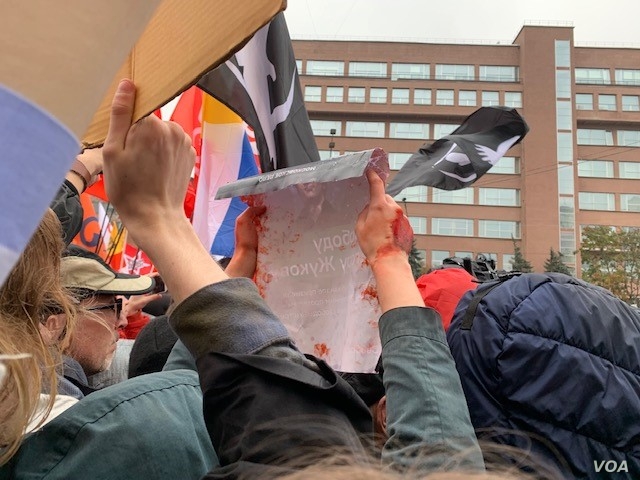 Courtesy: J. Dettmer/VOA
Courtesy: J. Dettmer/VOA
Russia’s Three Musketeers Moment: Is It “All for One and One for All?”
Russian civil society is becoming increasingly prominent. Today, reporting highlighted a study revealing the “protest movement is spreading across the country and narrowing its focus to political issues.” Between April and June, the study documented 434 rallies. Almost a third of these protests addressed social and political issues. Events since June have further confirmed these findings.
On June 6th, Ivan Golunov, an investigative journalist for the Latvian based Meduza, was arrested on drug charges, which were widely perceived as fabricated. The outpouring of support following the arrest was described as “a watershed moment,” when journalists “from across the political spectrum” saw the arrest by the authorities as a step too far. For years, Russian journalists “long lamented” the absence of a journalistic community. There wasn’t a sense the profession was obligated to come to the defense of one of its members. Then something “nearly unfathomable” happened. Unlike Gazprom’s takeover of NTV or Anna Politkovskaya’s murder, Golunov’s arrest rallied journalists, “including many from the pro-Kremlin media establishment,” together in a groundbreaking “show of solidarity.” Three major Russian newspapers printed front-page headlines in support. On June 11th, the Golunov’s case was dropped.
The case was portrayed as a rare victory for Russian civil society. Analysts cautioned assigning too much importance to the event. They said “Golunov was simply not important enough for authorities to sacrifice their pubic ratings over.” By itself Golunov’s release might not mean much, but considered within the broader activities of Russian civil society it highlights an important shift occurring within the country.
Before Golunov’s release, activists successfully prevented the construction of a church over a park in Yekaterinburg. While the protests during “Moscow’s Summer of Discontent” dominated the news coverage, there were also ongoing protests over new landfills to deal with Moscow’s trash. Recently, the “Moscow Case” has mobilized people calling for the release of those detained in Moscow during the summer’s protests.
Over the last few weeks, there has been “unprecedented public outcry.” This most recent activism echoes the earlier efforts to free Golunov. Segments of civil society like Orthodox priests, doctors, teachers, students, and IT professionals came together to speak out against the prosecution of people detained during the summer protests. Pavel Ustinov, a Russian actor, was arrested for allegedly injuring someone while resisting arrest. Like journalists in the Golunov case, Ustinov’s fellow actors championed his cause in “Instagram videos, curtain calls and late-night television jokes.” Under this pressure, a Moscow court overturned Ustinov’s original 3 ½ year sentence, and it instead handed him a one year suspended sentence.
So far, prosecutors have dropped criminal charges against six of the fourteen defendants in the “Moscow Case.” The prominent role journalists and actors played in the cases of Golunov and Ustinov sparked some criticism that interest groups were only looking after their own. Such criticism, however, overlooks a critical evolution occurring in Russian civil society.
The mobilization of professional groups reflects how far civil society has come. It is a sign society is “moving from atomization to greater solidarity and mutual trust.” Over the past decade, grass-roots movements helped reorient social consciousness. This development struggles against the “deep distrust” most Russians have “of the whole public sphere,” whether it’s the institutions of political authority or social organizations. Russians largely “rely on tight-knit family networks.” The pervading attitude has been “[e]ach one for oneself.” Now, Russia is beginning to move away from that mindset. For example, medical professionals formed the “Doctors Alliance” trade union to strike over low wages. Practical and non-political objectives like wages make up the bulk of activism, but “civil action increasingly leads to its participants becoming politicized.” The actions of journalists and actors show how civil society is progressing, since “compartmentalized solidarity evolves into a broader civic solidarity.”
This growing activism isn’t confined to professional groups. On Sunday, more than 20,000 people gathered in Moscow to protest the government’s handling of the “Moscow Case.” It was the largest demonstration since the summer’s protests. Significantly, the protestors represented a diverse mix of the public, “including liberals, libertarians, leftwingers and students.” This diversity shows “protests supporting political prisoners are not niche anymore.” An “all for one and one for all” mindset may be starting to take root. Russians are beginning to identify with people like Golunov and Ustinov. Witnessing their situations, everyday Russians “understood with frightening clarity their own defenselessness vis-à-vis the Russian state’s security machine.” The goal isn’t to destabilize the system, instead it is to loosen the “mafia-like grip” of security services rather than “fight for true democracy.”





